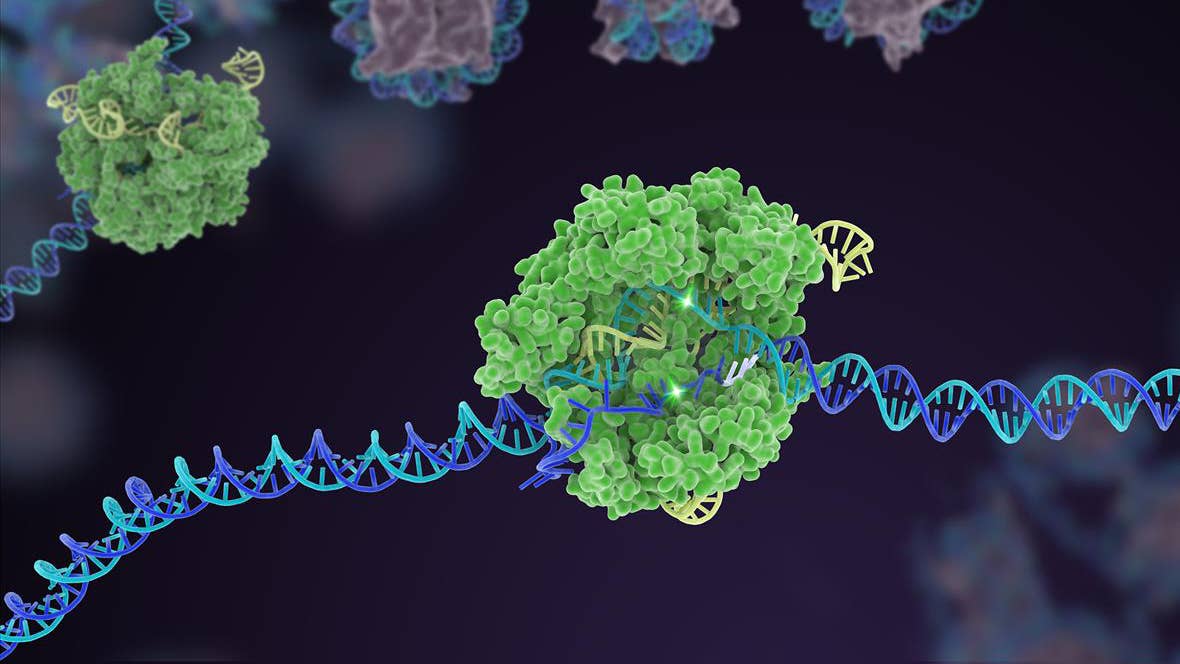What Happens When Tech Takes Control of Evolution?

Share
Over the span of a few billion years, diversity of life has flourished on Earth through the process of natural selection. Then, not long ago (relatively), human intelligence evolved.
For the first time one species, Homo sapiens, could consciously control its destiny on this planet. Humans have been shaping ourselves, the environment and other species for thousands of years. Soon, we’ll be able to fully control our own biology too, transcending our natural limitations.
According to roboticist and author Daniel Wilson, “You can graph human evolution, which is mostly a straight line, but we do get better and change over time, and you can graph technological evolution, which is a line that's going straight up. They are going to intersect each other at some point, and that's happening now.”
Genetic engineering and neurotechnology are examples of fields shaping human evolution. Taking control of evolution means what was once a slow, random process will now be exponentially faster. Soon, we’ll imagine what kind of a species we want to be and then become what we envision. But how?
From Biological to Digital Evolution
Advances in science and technology may allow us to control biology’s most fundamental force. The discovery and development of the gene-editing tool CRIPSR/Cas9 has taken the world by storm with targeted genome editing. Last year, geneticists from China used it to modify embryonic DNA. The process was far from perfect, as only 28 of 86 initial embryos were successfully spliced, and only a small number of those contained the intended genetic material.
However, the potential is enormous.
With CRISPR/Cas9, it’s possible to modify the genome of any living organism. While legal battles over the gene-editing tool continue, many are already anticipating potential applications of genetic engineering tools, such as the ability to eradicate mosquitoes spreading malaria, prevent genetic diseases, or conserve biodiversity in the environment.
By controlling the genetic language of life, we can more directly control nature to our benefit. This is already happening. Just last year, gene editing saved a girl dying of leukemia for the first time, highlighting the potential for genetic engineering to enhance medical treatment.
In parallel, we are seeing exponential growth in DNA sequencing and big data analytics—tools that will further catalyze the rise of genetic engineering.
According to Arthur Georges from the University of Canberra, “New machines which can yield terabytes of genetic information will make it possible for anyone to have their entire DNA sequenced in less than a week for $1,000. Theoretically, this information could be used to predict diseases, cancer and obesity years ahead of when they actually develop.”
In addition, humans are evolving away from biological systems toward more technological ones. Beyond genetic engineering, many forms of emerging neurotechnologies will allow us to modify our brains, and consequently our mental capacities, by merging with technology.
Advances in prosthetic limbs are early examples of such a technology. Today, they are allowing some humans to overcome biological limits.
Engineers from around the world are developing prosthetics that can perform complex tasks, and many versions are controlled solely by the patient’s mind. We’ve also seen the development of prosthetic technology that can allow users to feel their artificial limbs by feeding into the brain’s sensory systems. While there is plenty of room for improvement in cost and overall technology, experts are optimistic about the manner in which technology is merging with biology.
The question that remains is, if controlling our biology can be used to treat medical cases, why not apply it to enhance other traits, such as physical and mental capabilities? Prosthetics will be able to do far more than just replace body parts lost to injury or disease. According to Andy Miah, director of the Creative Futures Institute, they will extend the boundaries of what humans can normally do.
Far into the future, there are many radical implications of modifying our biology.
Be Part of the Future
Sign up to receive top stories about groundbreaking technologies and visionary thinkers from SingularityHub.


As we challenge the impossible further, we may see the emergence of new sexes, babies with genes from multiple parents and entirely new language for our DNA. Some imagine a world where we write genomes like we create art. Physicist Freeman Dyson has famously said, “In the future, a new generation of artists will be writing genomes as fluently as Blake and Byron wrote verses.”
A Double-Edged Sword
Like any other technology, the future of such biological and technological tools depends on how we use them. Evolution has long been a blind process, guided by pressures from the environment and random genetic mutations. Not anymore. For the first time in the history of our planet, one species—ours—has the power to think through what traits it wishes to select for.
Many have raised concerns over the negative applications of genetic engineering, including eugenics-like movements, bioweapons, superbugs and super-soldiers. There are serious social and ethical concerns about the kind of legal controls that are to be placed on research in the field. There’s also uncertainty around the potential unintended consequences of genetic manipulation.
How should the limits of research be decided? Who should have access to such technologies? How can we ensure that survival of the fittest does not become survival of the wealthy? How are we to decide which traits are desirable or not? These are significant questions we must grapple with in order to maximize the benefits and minimize the harm of modifying our biology.
But the potential benefits of modifying biology are revolutionary. Doctors would gain access to a powerful tool to tackle disease, allowing us to live healthier lives. We might extend our lifespan and modify our brain’s building blocks to become more intelligent and capable.
Stephen Hawking notes that “with genetic engineering, we will be able to increase the complexity of our DNA, and improve the human race.”
Genetic engineering, biotechnology and neurotechnology are catalyzing the powerful transition from biological to digital evolution—and the latter will be exponentially faster and more powerful. It’ll soon be up to us what direction we choose.
Image credit: Shutterstock
Raya Bidshahri is the founder and chief executive officer of School of Humanity, an award-winning online high school where we learn by having a positive impact on the world. She has been featured by the BBC as one of the 100 most influential and inspiring women globally. Her mission is to reinvent global education systems in order to better serve humanity.
Related Articles

Souped-Up CRISPR Gene Editor Replicates and Spreads Like a Virus

Elon Musk Says SpaceX Is Pivoting From Mars to the Moon

Your Genes Determine How Long You’ll Live Far More Than Previously Thought
What we’re reading
